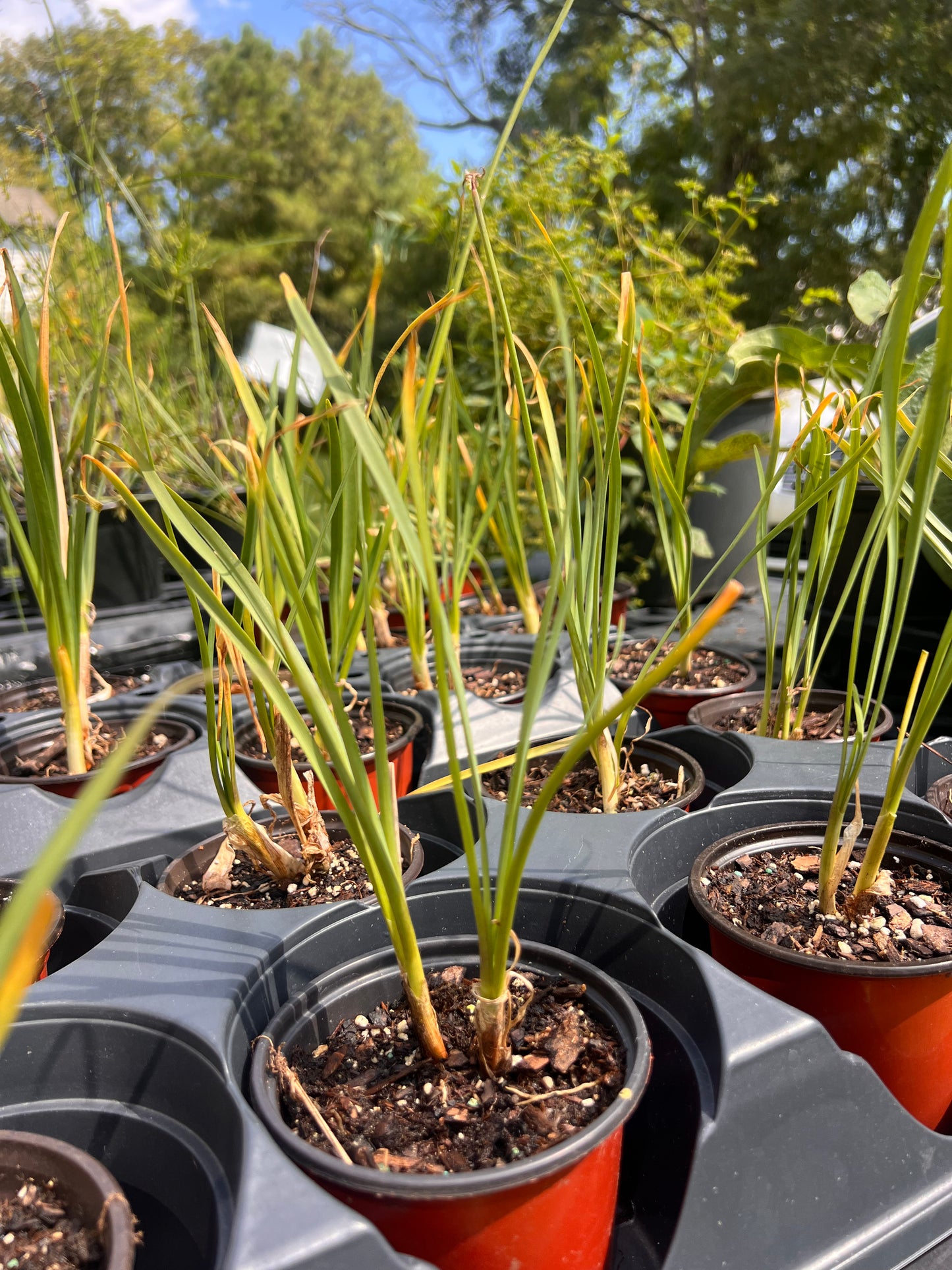Tulbaghia violacea 'Society Garlic'
Tulbaghia violacea 'Society Garlic'
Society Garlic (Tulbaghia violacea) is an attractive, clump-forming perennial known for its grass-like, gray-green leaves and clusters of lavender-pink, star-shaped flowers that bloom on tall, slender stalks. The flowers are mildly fragrant, with a scent similar to garlic, but the plant is notably less pungent than true garlic. The leaves, when crushed, release a garlic-like aroma, giving the plant its common name. Society Garlic is part of the Amaryllis family and is often used as an ornamental plant in gardens due to its drought tolerance and deer resistance.
Grow Zone
Society Garlic thrives in USDA hardiness zones 7-10. In colder zones, it can be grown as an annual or in containers that can be brought indoors during the winter.
Height and Width
- Height: Society Garlic typically grows to a height of 1 to 2 feet (30 to 60 cm), including the flower stalks.
- Width: It can spread to about 1 to 2 feet (30 to 60 cm) wide, forming a neat clump.
Uses
Society Garlic is versatile in the garden and has several uses:
- Ornamental: Its attractive flowers and foliage make it a popular choice for garden beds, borders, and rock gardens.
- Edging Plant: It is often used as a border or edging plant due to its neat growth habit and low maintenance requirements.
- Containers: Society Garlic is well-suited for container gardening, where it can be used on patios, balconies, or decks.
- Herb Garden: The leaves and flowers are edible and can be used in cooking as a milder alternative to garlic, adding flavor to salads, soups, and sauces.
- Medicinal: Society Garlic has been used in traditional medicine for its antimicrobial properties, although it is less potent than true garlic (Allium sativum).
- Insect Repellent: The garlic-like scent is said to repel insects, making it a useful companion plant in vegetable gardens.
Native Range
Society Garlic is native to South Africa, where it grows in grasslands and rocky outcrops. It is well-adapted to dry, sunny conditions and is often found in similar environments in cultivation.
How to Grow Society Garlic
1. Planting Time:
- Plant in the spring after the last frost, or in early fall in warmer climates.
- It can also be grown from seed, but division of clumps is the more common method.
2. Soil Preparation:
- Society Garlic prefers well-drained soil with a slightly acidic to neutral pH (6.0-7.0).
- It can tolerate poor soils but performs best in moderately fertile conditions.
- Amend heavy clay soils with compost or sand to improve drainage.
3. Planting:
- Space plants about 1 to 2 feet apart to allow for their mature size.
- Plant the rhizomes or seedlings at the same depth they were growing in their previous location.
- Water thoroughly after planting to help establish the roots.
4. Watering:
- Water regularly during the first growing season to establish a strong root system.
- Once established, Society Garlic is drought-tolerant and requires minimal watering, although it will benefit from occasional deep watering during prolonged dry periods.
5. Sunlight:
- Society Garlic thrives in full sun but can tolerate partial shade.
- In hotter climates, it may benefit from some afternoon shade to prevent leaf scorch.
6. Fertilization:
- Fertilize in spring with a balanced, slow-release fertilizer.
- Additional feedings can be applied every 6-8 weeks during the growing season, especially in poor soils.
- Mulch around the base of the plant to retain moisture and suppress weeds.
7. Pruning and Maintenance:
- Remove spent flower stalks to encourage continuous blooming and maintain a tidy appearance.
- Trim back the foliage in late fall or early spring to tidy up the plant.
- Divide clumps every 3-4 years to prevent overcrowding and rejuvenate the plant.
8. Winter Care:
- In zones 7-8, Society Garlic may die back in the winter but will regrow in the spring.
- In colder zones, mulch heavily in the fall or bring container-grown plants indoors for winter protection.
- Container plants can be overwintered in a cool, bright location with minimal watering.
9. Pest and Disease Management:
- Society Garlic is generally pest-resistant and not prone to serious diseases.
- Its garlic-like aroma helps deter deer and rabbits, making it a good choice for gardens with wildlife issues.
Society Garlic is an attractive, low-maintenance plant that adds beauty and utility to gardens with its fragrant flowers and foliage. Its drought tolerance and resistance to pests make it a reliable choice for a variety of landscaping applications.
---SHIPPING NOTICE PLEASE READ BEFORE PURCHASING LIVE PLANTS!---
We WILL NOT refund the purchase of or the shipping cost of live plants purchased with the intent to be shipped to states that do not authorize importing live plants or to states with restrictions! Purchases to these states will be held for 30 days for pick-up at our Slidell, Louisiana store and the shipping cost associated with these purchases will be held for the care of the plant while waiting to be picked up. All sales are final. If the plant(s) purchased are not picked up within 30 days from the date of order, these items will be returned to our sales inventory and you WILL NOT be refunded. Thank you for understanding these policies.
Due to regulations, certain states have restrictions on importing plants. Please review the list below to ensure you're not attempting to order any restricted plants in your area.
**Important Note:** We do not ship any plants outside the U.S.
State-Specific Restrictions - We ARE NOT responsible for any plant(s) that are not listed in these restrictions. Purchaser bears all responsibility for making sure the plant(s) they desire to purchase are not banned from being imported to the shipping state:
Arizona: Juglans spp.
California: Castanea spp., Juglans spp., Pinus spp., Quercus spp.
Colorado: Some counties restrict Prunus spp. Please verify your local county regulations.
Florida: Castanea spp., Cornus spp., Quercus spp., Cornus mas
Georgia: Vaccinium spp.
Hawaii: Pinus spp.
Idaho: Humulus lupulus, Mentha spp., Vitis spp.
Indiana: Fragraria spp., Rosa spp.
Kansas: Juglans spp.
Michigan: Abies spp., Vaccinium spp.
Montana: Pinus spp.
Nevada: Allium spp.
Mentha spp.
New Jersey: Rosa spp.
New York: Vitis spp.
Oregon: Allium spp., Castanea spp., Corylus spp., Humulus lupulus, Quercus spp., Sambucus nigra, Ulmus spp., Vaccinium spp., Vitis spp.
Texas: Juglans spp.
Washington: Allium spp., Castanea spp., Corylus spp., Humulus lupulus, Vaccinium spp., Vitis spp.
Wisconsin: Abies spp., Pinus spp., Picea spp., Mentha spp.
Additionally, we cannot ship plants in soil medium to the following states: AK, AL, AR, AZ, CA, HI, ID, KS, MS, MT, ND, NM, NV, OK, OR, SD, TX, UT, WA.
Couldn't load pickup availability


